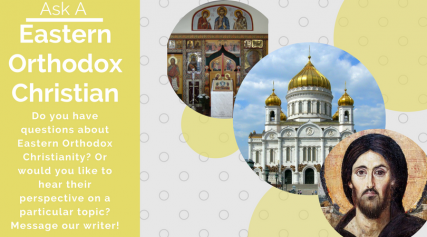What would you like to know about the Eastern Orthodox Christian faith? Submit your question.
Is it required to have a single tattoo removed if it was done before converting to the Eastern Orthodox Church?
In my humble opinion, the question you ask is, at best, almost irrelevant. When converting to the Orthodox faith, one does not expect to go back and rewrite their past, but begin their journey from the point of commitment. If your tattoo is demonic or problematic in some other way, one needs to consult the guidance of your priest or spiritual father.
In the Old Testament book of Leviticus 19:28 it reads,
“You shall not make any cuttings in your flesh for the dead, nor tattoo any marks on you: I am the Lord.”
In the Eastern Orthodox Church, no canon states that an Orthodox Christian can not get a tattoo. However, we know that scripture tells us in 1Corinthians 6:19-20,
“Or do you not know that your body is the temple of the Holy Spirit who is in you, whom you have from God, and you are not your own? For you were bought at a price; therefore glorify God in your body and in your spirit, which are God’s.”
To further illustrate where the emphasis of the faith is, It is far better to have a clean cup on the inside rather than what may seem clean on the outside. An example in Scripture found in Matthew 23:25,
“Woe to you, scribes and Pharisees, hypocrites! For you cleanse the outside of the cup and dish, but inside they are full of extortion and self-indulgence.”
Outward expressions of our beliefs are a validation of our inward faith. Making the sign of the cross, disciplining, or in the immersion in water in Baptism is an outward expression of an inward belief. The focal point in Holy Baptism is the dying of the worldly person and the resurrection of that person in a life of Christ, not just in proclamation or association, but in word, deed, and behavior.
The Orthodox faith is not a religion; it is “a way of life” with guideposts to aid in each person’s journey. The will of God for us is to become more like Him by His grace and mercy and should be understood by all that a Christian is a work in progress.
Becoming Orthodox is not a conversion, but more so a transformation of self. It is not a so much a destination, but a journey where one through their expressions of love strives to live a moral life in the likeness of Christ. This transfiguration is known to Orthodox as theosis where one strives to acquire a repentant mind, heart, and humble attitude, opening the door to receive the fullness of all that the Father wants to give us.
It is our autonomous prideful self (a perpetuation of the fall) that inhibits us (closes the door) to receive eternal joy, peace beyond understanding, and the experience of divine and unconditional love or simply put to become love to one another.










